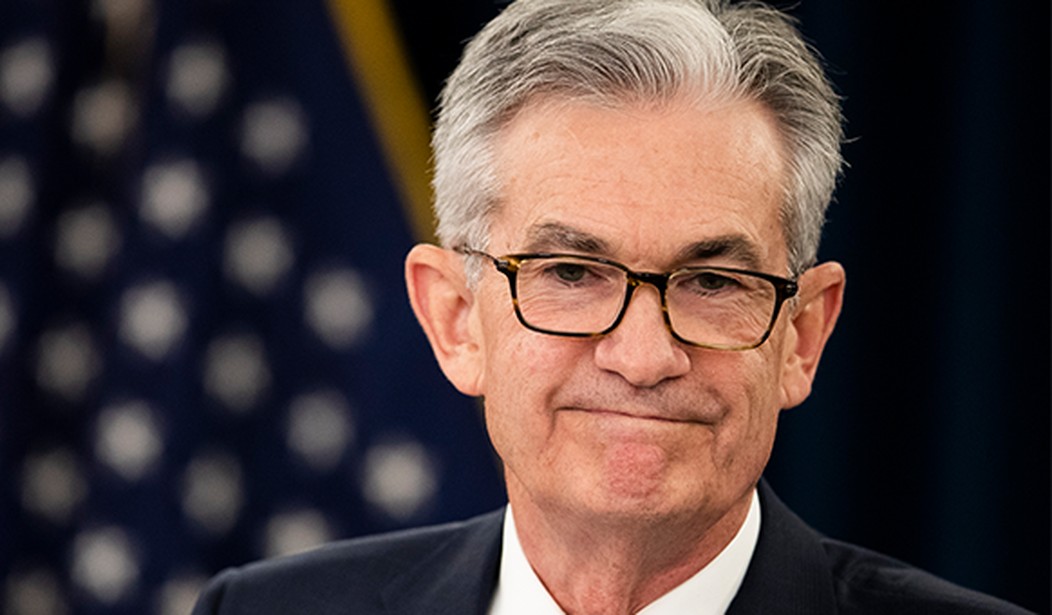As prices continue to rise, Federal Reserve Chairman Jerome Powell admitted that “inflation could turn out to be higher and more persistent than we expected,” but he repeated President Joe Biden’s line that there’s nothing to see here. He insisted that inflation indicators “appear broadly consistent” with the Fed’s goal, and he promised that if it truly gets out of hand, the Fed would step in to change policy.
“As the reopening continues, bottlenecks, hiring difficulties, and other constraints could continue to limit how quickly supply can adjust, raising the possibility that inflation could turn out to be higher and more persistent than we expected,” Powell admitted in a press conference on Wednesday.
That said, the Fed chairman insisted that “indicators of long-term inflation expectations appear broadly consistent with our longer-run inflation goal of 2%. If we saw signs that the path of inflation or longer term inflation expectations were moving materially and persistently beyond levels consistent with our goal, we’d be prepared to adjust the stance of policy.”
Recommended: Biden’s Response to the Ominous Specter of Inflation Should Set Off More Alarm Bells
While “the effects of the [COVID-19] pandemic on the economy have continued to diminish,” Powell warned that “risks to the economic outlook remain.” He noted that “the pace of vaccinations has slowed and the Delta strain of the virus is spreading quickly in some areas. Continued progress on vaccinations would support a return to more normal economic conditions.”
Powell’s admission that inflation could turn out to be “more persistent” than expected may come as a surprise to President Joe Biden. Earlier this month, Biden said, “There’s nobody suggesting there’s unchecked inflation on the way — no serious economist.”
While Powell remained cautiously optimistic that inflation would fall within the Federal Reserve’s goals, his admission that inflation might end up rather persistent contradicted Biden’s unwarranted confidence on the issue.
Biden’s profligate spending, financed with increased debt, has arguably helped drive up prices, combining with macroeconomic trends such as post-COVID supply-chain adjustment and the end of a Goldilocks era of continual expansion in the global workforce. Yet Biden suggested that the solution to inflation is… more government spending, of course!
Economists at Deutsche Bank recently sounded the alarm, warning that Biden’s economic policies seem based on an irrational belief in a Goldilocks economy.
“The most basic laws of economics, the ones that have stood the test of time over a millennium, have not been suspended. An explosive growth in debt financed largely by central banks is likely to lead to higher inflation,” Deutsche Bank economists warned. “We worry that the painful lessons of an inflationary past are being ignored by central bankers, either because they really believe that this time is different, or they have bought into a new paradigm that low interest rates are here to stay, or they are protecting their institutions by not trying to hold back a political steam roller.”
The Core Consumer Price Index (CPI) for all items rose 5.4 percent for the 12 months ending in June 2021. It has increased every month since January, when the 12-month change had been 1.4 percent. The index for all items minus food and energy rose 4.5 percent over the last 12 months, the largest 12-month increase since the period ending November 1991. The energy index rose a whopping 24.5 percent over the last 12 months, and used car prices increased 45.2 percent in annual terms.
Consumer expectations for inflation over the coming year reached the highest level ever, according to a survey by the Federal Reserve Bank of New York. An American Action Network poll found that 86 percent of Americans said they are concerned about rising prices and that 75 percent of them are worried that Democrat spending proposals could cause inflation.
Meanwhile, unemployment remained at 5.9 percent in June. This persistent unemployment should not surprise Americans who are familiar with the Democrats’ $1.9 trillion blue pork bill masquerading as a “COVID-19 relief” stimulus. Only 8.6 percent of the funding went directly to combatting the pandemic, while hundreds of billions went to blue-state bailouts. The bill also sent $1,400 checks to individuals and extended the $400/week “enhanced” unemployment benefits.
Thanks to this “enhanced” unemployment, many workers make more money without a job than they did when they had one. Rather than reconsidering this perverse incentive not to work, Biden and his fellow Democrats further entrenched it.
Biden’s other policies would also make the economic situation worse. The president has called for Congress to spend trillions more in social programs that his tax plans cannot hope to fund. Essentially printing money decreases trust in the U.S. dollar and sparks inflation.
“Reckless government spending always has caused inflation. We’re up to almost $30 trillion worth of debt, we already — this year! — spent $1.9 trillion, the Democrats did, in spending. They have another plan to spend at least $5.5 trillion more. This is going to cause more and more inflation,” Sen. Rick Scott (R-Fla.) warned in a press conference on Wednesday.
Recommended: Deutsche Bank Issues a Terrifying Warning for America Under Biden
Biden cannot ignore the ominous specter of inflation, and even the Fed chairman has admitted that inflation might become “higher and more persistent” than he expected. This is no time for increased debt-financed government spending.









Join the conversation as a VIP Member